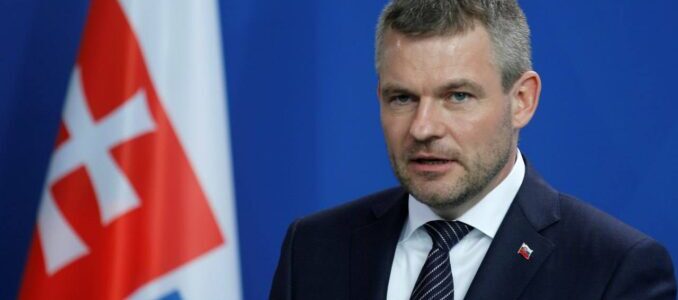
Populist Peter Pellegrini has been elected president of Slovakia, replacing liberal Zuzana Kaputova.
Pellegrini, 48, defeated pro-Western Ivan Korc, a former diplomat, with 53% of the vote.
A former prime minister, he is an ally of Prime Minister Robert Fico and shares his dovish attitude toward Russia.
Mr. Fico and his allies now control Slovakia’s parliament, government, and soon the presidency.
Slovakia was one of Ukraine’s most staunch allies before Mr. Fico came to power in October, promising to stop supplying military supplies to the Slovak army in Kyiv. With Mr. Pellegrini’s election to replace Ms. Kaputova, Ukraine finally lost its voice of support in the EU and NATO capitals.
Mr. Fico called for an end to Western military support for Ukraine, an immediate ceasefire and peace talks with Moscow. He said that President Vladimir Putin had recently been “unfairly demonized” and claimed that Ukraine’s acceptance into NATO would mean the start of World War III.
Mr. Pellegrini’s campaign has echoed this Moscow-friendly rhetoric, accusing Mr. Korcok of being a warmonger who would send Slovak soldiers to fight in Ukraine, a constitutional power the president does not have.
On Sunday, Mr. Pellegrini promised to “ensure that Slovakia remains on the side of peace, not on the side of war.”
“You don’t have to worry that the presidential palace, as it has been for the last 10 years, will become the center of an opposition, opportunistic power that will harm the government, that will harm the state abroad and that will rejoice in the failures of the Slovak government,” he said.
After Ms. Kaputova resigns in June, Slovakia, a country that only a year ago handed over its entire fleet of MiG-29 aircraft to Ukraine, will no longer have a single high-ranking official who unequivocally supports Kyiv’s efforts to defend its territory by force.
Mr. Korchok expressed his outrage at Pellegrini’s campaign tactics, saying that it was fear that decided the outcome of the election, and “this fear was spread by those who hide in public office.”
He said of the result: “It turns out that it is possible to become president of the Slovak Republic not only by spreading hatred, stirring up passions and pushing people to the barricades, but also by portraying the opposite number, that is, me, as a war candidate. I will not forget this.”
The liberal, pro-Western opposition also accuses Mr. Pellegrini – as head of the coalition Voice party and speaker of parliament – of remaining silent as Mr. Fico destroyed Slovakia’s criminal justice system, in particular by abolishing the Special Prosecutor’s Office, which was created 20 years ago to investigate serious corruption and economic crimes.
It had investigated a number of high-ranking officials from Mr. Fico’s Smer party and overseen the prosecution of those believed to be responsible for the 2018 murders of investigative journalist Jan Kuciak and his fiancée Martina Kusnirova.
The murders were a seismic event in Slovak politics. The aftermath ended Mr. Fico’s second term as prime minister in 2018 and led to the election of the liberal, pro-Western Zuzana Kaputova as president, riding a wave of popular anger against official corruption and organized crime.
Robert Fico’s government recently targeted Slovakia’s public broadcaster, submitting plans to eliminate it and replace it with virtual state control. These plans were shelved after Peter Pellegrini’s unexpectedly poor result in the first round of the presidential election two weeks ago.
The opposition fears that a renewed Robert Fico will resubmit them – and they say that President-elect Pellegrini is unlikely to stand in his way.